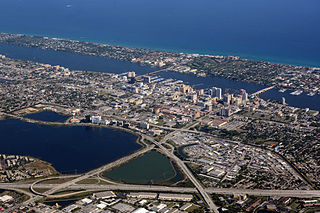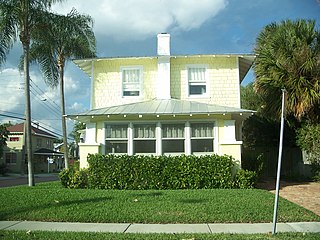
Palm Beach County is a county in the southeastern part of Florida, located in the Miami metropolitan area. It is Florida's third-most populous county after Miami-Dade County and Broward County and the 26th-most populous in the United States, with 1,492,191 residents as of the 2020 census. Its county seat and largest city is West Palm Beach, which had a population of 117,415 as of 2020. Named after one of its oldest settlements, Palm Beach, the county was established in 1909, after being split from Miami-Dade County. The county's modern-day boundaries were established in 1963.

Boynton Beach is a city in Palm Beach County, Florida, United States. It is situated about 57 miles (92 km) north of Miami. The 2020 census recorded a population of 80,380. Boynton Beach is located in the Miami metropolitan area, which was home to 6,138,333 people at the 2020 census. The city is named after Nathan Boynton, a Civil War major and Michigan politician who became one of the first settlers in the area in 1895. Boynton Beach is located north of Delray Beach, south of Hypoluxo and Lantana, and east of Golf, while the municipalities of Briny Breezes, Gulf Stream, Manalapan, and Ocean Ridge are situated to the east across the Intracoastal Waterway.

Lake Worth Beach, previously named Lake Worth, is a city in east-central Palm Beach County, Florida, United States, located about 63 miles (101 km) north of Miami. The city's name is derived from the body of water along its eastern border known as the Lake Worth Lagoon, which was named for General William J. Worth, who led United States Army forces during the last part of the Second Seminole War. Lake Worth Beach is situated south of West Palm Beach, southeast of Lake Clarke Shores, east of Palm Springs, and north of Lantana, while a small section of the city also partitions the town of Palm Beach. The 2010 census recorded a population of 34,910, which increased to 42,219 in the 2020 census. Lake Worth Beach is within the Miami metropolitan area, which was home to an estimated 6,138,333 people in 2020.

Palm Beach is an incorporated town in Palm Beach County, Florida, United States. Located on a barrier island in east-central Palm Beach County, the town is separated from West Palm Beach and Lake Worth Beach by the Intracoastal Waterway to its west and a small section of the Intracoastal Waterway and South Palm Beach to its south. It is part of the South Florida metropolitan area. As of the 2020 census, Palm Beach had a year-round population of 9,245.

West Palm Beach is a city in and the county seat of Palm Beach County, Florida, United States. It is located immediately to the west of the adjacent Palm Beach, which is situated on a barrier island across the Lake Worth Lagoon.

Mar-a-Lago is a resort and National Historic Landmark in Palm Beach, Florida. It spans 126 rooms and 62,500 sq ft (5,810 m2) built on 17 acres of land. Since 1985, it has been owned by United States president-elect Donald Trump, who lives on the estate as his primary residence.

The Mango Promenade Historic District is a U.S. historic district located in West Palm Beach, Florida. The district is bounded by South Dixie Highway, Austin Lane, Coconut Lane, and Cranesnest Way. It contains 125 historic buildings.

The Downtown Miami Historic District is a U.S. historic district located in the Central Business District of Downtown Miami, Florida.

The Hurricane of 1928 African-American Mass Burial Site is a pauper's cemetery and mass grave in West Palm Beach, Florida. It is listed on the U.S. National Register of Historic Places. The cemetery is situated near the junction of 25th Street and Tamarind Avenue between I-95 and U.S. Route 1. The site is the location in which 674 bodies of African Americans or those of an unknown race were buried following the 1928 Okeechobee hurricane, while most of the white victims of the storm received a proper burial at Woodlawn Cemetery due to segregation laws.

The Old Martin County Court House, built in 1937, 12 years after the erection and organization of Martin County and to the south - Palm Beach County), is a historic Art Deco style of architecture courthouse building located at 80 Southeast Ocean Boulevard in the county seat and largest town of Stuart, Martin County, Florida.

The Krueger House is a historic house in Stuart, Martin County, Florida. It is located on the grounds of the historic Burn Brae Plantation. On February 14, 2002, it was added to the U.S. National Register of Historic Places.

The Schoolhouse Children's Museum & Learning Center is located in a historic school building, the Boynton School, at 129 East Ocean Avenue in Boynton Beach, Palm Beach County, Florida.

The Fred C. Aiken House is an example of Addison Mizner's Mediterranean-inspired architecture from 1925. This historically designated residence is Located at the corner of Paloma Avenue and Hibiscus Street, in the Old Floresta Historic District in Boca Raton, Florida.

Rowallan is a historic site in Ormond Beach, Florida, United States. It is located at 253 John Anderson Highway. On October 6, 1988, it was added to the U.S. National Register of Historic Places.

This is a list of the National Register of Historic Places listings in Palm Beach County, Florida.

The Clematis Street Historic Commercial District is a U.S. historic district located in West Palm Beach, Florida. The district runs along the 500 Block of Clematis Street. It contains 12 historic buildings.
Seabreeze is a beachside neighborhood in Daytona Beach, Florida, which existed as an independent city from May 24, 1901, until January 1, 1926, when it merged with Daytona and Daytona Beach to become one consolidated city.

Maurice Fatio (1897–1943) was a Swiss-born American architect.

Woodlawn Cemetery is located at 1301 South Dixie Highway in West Palm Beach, Florida. It consists of three cemeteries: Woodlawn Cemetery, the Jewish Cemetery, and Woodlawn Cemetery North.

The Royal Poinciana Way Historic District is a historic commerce and residential district in Palm Beach, Florida. The district is bounded by the area from 207-283 Royal Poinciana Way, 95-118 North County Road, and 184-280 Sunset Avenue, with some exceptions. There are 36 buildings within the district, 26 of which are considered contributing properties. The Royal Poinciana Way Historic District became a listing in the National Register of Historic Places (NRHP) on September 17, 2015. A post office located at 95 North County Road has also been listed in the NRHP since 1983. Further, the town of Palm Beach considers the post office, Bradley House Hotel, and the Biltmore Apartments as town landmarks.





















